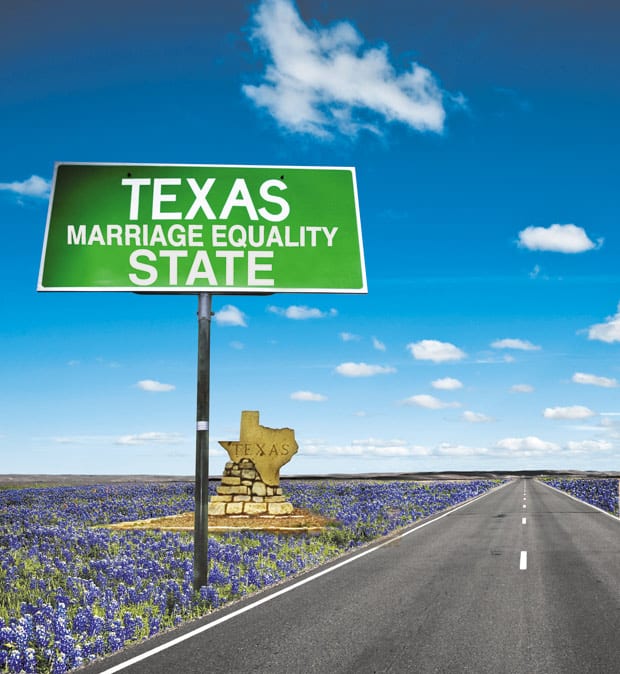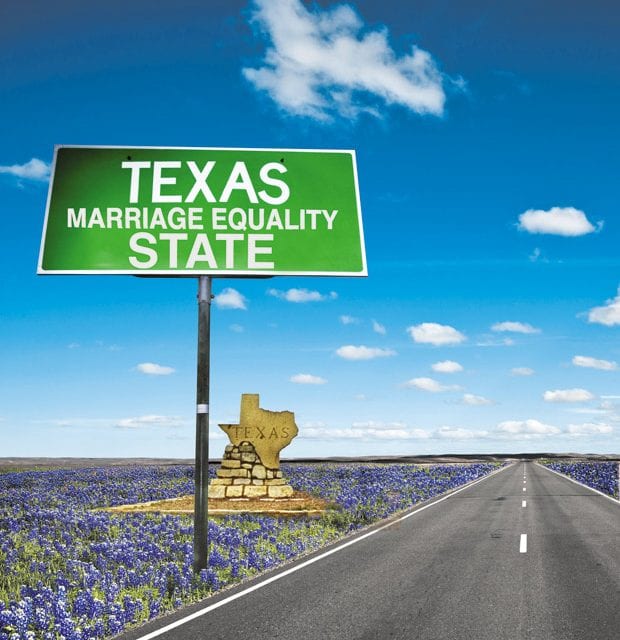
James Russell | Staff Writer
For same-sex couples, getting married is, unfortunately, easier said than done — at least in Texas, where uncertainty looms among the officials responsible for issuing marriage licenses.
So far, county clerks in both Dallas and Tarrant counties have said they would issue licenses to same-sex couples if the Supreme Court rules in favor of marriage equality.
Dallas County Clerk John Warren has previously indicated to Dallas Voice he will extend hours to accommodate an influx of couples, if a pro-equality ruling comes. Tarrant County Clerk Mary Louise Garcia has not said whether she will extend hours, but she has said she will comply with the law and anticipates no issues.
Elsewhere in North Texas, Collin County Clerk Stacey Kemp’s spokeswoman said she was unsure of any plans and would have Kemp call us back. That call didn’t come by press deadline.
Denton County plans to follow the law but has not provided more information. Dallas Voice was waiting at deadline to hear back from the Henderson County Clerk.
Outside of North Texas, Bexar and Travis County clerks are also ready to issue licenses and extend hours to accommodate couples as soon as a positive ruling is issued.
El Paso County Clerk Delia Briones told The El Paso Times she had “every intention to follow the law.” But that doesn’t mean she’ll immediately issue licenses. She said she’ll wait for the state to change the forms.
Lubbock’s County Clerk Kelly Pinion seems to be more accommodating. He told the local Fox News affiliate,
“There won’t be any extra work. It would just be processing. I’m assuming the qualifications are not going to change in the statute, so we would be asking the same questions and going through the same steps.”
Harris County is a different issue, however. County Clerk Stan Stanart has dug in his heels, telling the Houston Chronicle he’ll wait for a decision from state officials instead of just abiding immediately by a Supreme Court ruling. Stanart previously said a favorable Supreme Court ruling would “destroy the institution of marriage.”
In nearby Nueces County, “the County Clerk said her office is not making special accommodations for a Supreme Court ruling in favor of same-sex marriages until she receives guidance from the state,” according to the Corpus Christi Caller-Times.
Antsy and don’t want to wait? Good news even for those whose county clerk does not intend to issue licenses immediately following a SCOTUS mandate: A couple can get married in any Texas county, regardless of where they live.
So, what do you need to get a marriage license?
Submit proof of identity, which includes a driver’s license or identification card issued by Texas or another state; a U.S. passport; a current passport issued by a foreign country; an original or certified copy of a birth certificate printed within the last 10 years; a valid form of government issued ID; or a military ID card. (One of these is necessary; not all of them.)
Bring a checkbook, cash or card, too. A license generally costs somewhere between $70 and $80. dependent upon fees imposed by each county.
But once you’ve got a license, then what?
In Texas, first you first get a license then you get married. While there’s usually a 72-hour waiting period between the time the license is issues and the time a couple can wed, judges in Dallas and Travis counties have indicated they will waive the waiting period. They’ll also perform the ceremonies.
And of course, a religious leader (sans Billy Graham) may conduct the ceremony as well.
This article appeared in the Dallas Voice print edition June 26, 2015.
Getting a marriage license, and married, in Texas


